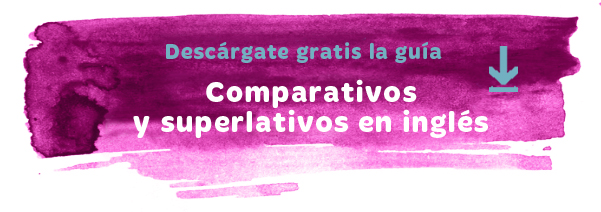What's Up! blog
el mejor contenido del mejor curso de inglés
El superlativo en inglés: todo lo que necesitas saber para ser lo más
Para expresarte con propiedad en inglés, es básico saber hacer comparaciones. En nuestro día a día, usamos los comparativos y superlativos en muchas ocasiones, así que es importante usarlos correctamente. Hoy vamos a repasar las normas básicas del superlativo en inglés: todo lo que necesitas saber para ser lo más.
¿Para qué sirve el superlativo en inglés?
Para entender el superlativo en inglés, lo primero que necesitas saber es que los adjetivos tienen tres grados diferentes:
- Grado positivo: el adjetivo se limita a describir una cualidad. Ejemplo: Sandra is tall.
- Grado comparativo: el adjetivo destaca la inferioridad, igualdad o superioridad de una persona o cosa respecto de otra. Ejemplo: Sandra is taller than Mike.
- Grado superlativo: el adjetivo indica que el sujeto posee la cualidad en el grado más alto y por encima de todos los demás. Ejemplo: Sandra is the tallest person in her office.
Por tanto, usamos el superlativo cuando queremos destacar que el sujeto se encuentra en el extremo superior o inferior de una cualidad.
¿Cómo se forma el superlativo en inglés?
A continuación te compartimos las normas básicas para formar el superlativo en inglés:
- El superlativo siempre va precedido del artículo determinado: the fastest, the tallest, the most intelligent.
- En el caso de los adjetivos de una sílaba, formamos el superlativo añadiendo -est al final: tall — tallest.
- Si el adjetivo tiene dos sílabas, podemos añadir -est o bien poner most delante del adjetivo. En muchos casos se utilizan las dos formas, pero una es más habitual que la otra.
- Si el adjetivo tiene tres sílabas o más, formaremos el comparativo añadiendo most: important — the most important.
- Cuando el adjetivo termina en consonante + vocal + consonante, la última consonante debe repetirse antes de añadir la terminación: fat — the fattest.
- Y si acaba en -y, debemos cambiarla por una i: happy — the happiest.
|
Comparativos y superlativos:
|
|
Excepciones al formar el superlativo en inglés
Pero todas las reglas tienen sus excepciones, y en el superlativo en inglés también tenemos unas pocas. Y es que algunos adjetivos son irregulares en sus formas de comparativo y superlativo. A continuación puedes ver los adjetivos y cómo se forma su superlativo especial.
- Bad: the worse.
- Good: the best.
- Far: the furthest / farthest.
- Little: the least.
- Much: the most.
Ejercicio sobre comparativos y superlativos en inglés
Encuentra y corrige los errores que hay en las siguientes frases:
1) The Saint Bernard is taller as the German Shepherd.
2) It’s more better for a dog to live in the country than in the city.
3) The Chihuahua is the most short dog of all.
4) I like driving in the summer much more better than driving in the winter.
5) His cat had much bigger eyes than my Chihuahua.
6) The sheepdog is much more heavier than the Cocker Spaniel.
7) The Saint Bernard is the much heaviest dog in the world.
Solución del ejercicio sobre comparativos y superlativos en inglés
A continuación puedes revisar las respuestas correctas:
1) The Saint Bernard is taller than the German Shepherd.
2) It’s better for a dog to live in the country than in the city.
3) The Chihuahua is the shortest dog of all.
4) I like driving in the summer much more than driving in the winter o I like driving in the summer much better than driving in the winter.
5) His cat had much bigger eyes than my Chihuahua. (Correcto)
6) The sheepdog is much heavier than the Cocker Spaniel.
7) The Saint Bernard is the heaviest dog in the world.
¿Qué tal han ido el ejercicio? Seguro que fenomenal. Ahora sólo queda incluir estos conocimientos sobre el superlativo en inglés en tu día a día.
En tu próxima conversación en inglés, intentar colocar algún superlativo para enriquecer tus frases. ¡A practicar!
Post relacionados:




